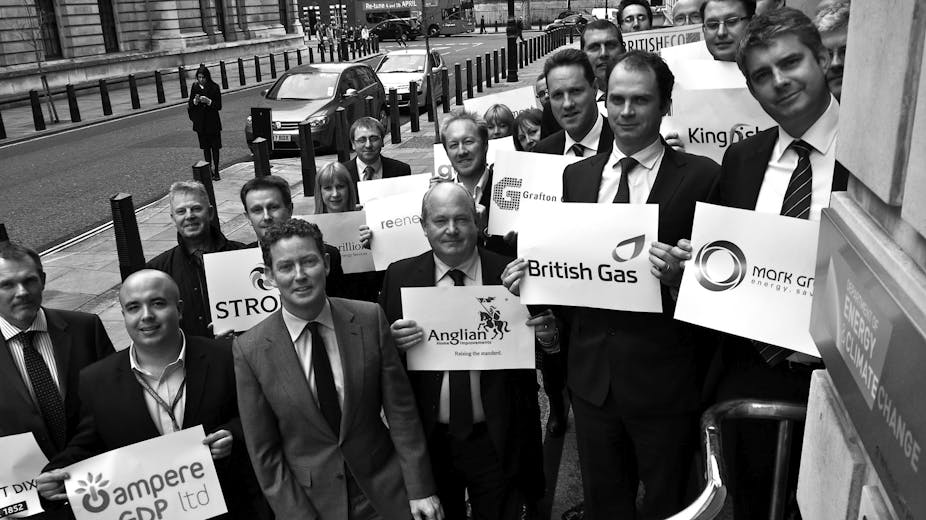Energy secretary Ed Davey has finally recognised that the take-up of Green Deal financing was “disappointing”, and the latest figures show how much it is flagging. But Davey analysis of the scheme shows the government is still missing the point when it comes to helping the public reduce their energy consumption. In order to be credible, the Green Deal must be promoted in local communities from the bottom up.
The Green Deal is a government-backed loan scheme aiming to help people lower their domestic energy consumption. While something like 150,000 assessments (which cost between £100 and £150) have been undertaken since the Green Deal was launched in December 2012, fewer than 1,000 of these assessments have been converted into work actually being done.
Davey offered three reasons for the Green Deal’s lack of success: that it is “too clunky and too complex”, not sufficiently “consumer friendly” and that the online experience of the Green Deal is disjointed. Davey’s shadow counterpart, Caroline Flint, took the opportunity to offer her own interpretation of the Green Deal’s failure: “With sky-high interest rates, hidden charges and penalty payments it’s no surprise that so few people have taken out a green deal plan.”
But evidence gathered by our research team strongly suggests both Davey and Flint are missing a key reason for the low take-up of the Green Deal offer: it needs to be promoted from a grassroots level.
The RECCKN project
Our Reducing Energy Consumption through Community Knowledge Networks (RECCKN) project spent the past two years working with households in the Midlands. We analysed how people find out about reducing their energy consumption and aimed to improve the circulation of this knowledge.
We found that householders get their knowledge about energy saving from a variety of sources. People mentioned newspapers, the internet, leaflets through the door, advertisements on television and friends and family, among other sources.
When these sources were ranked for trustworthiness, the results were striking. Virtually without exception, the least trusted sources of information were those involving large commercial organisations, such as the so-called Big Six energy companies. In contrast, the most trusted sources were friends and family, and local companies with which respondents had had some positive interaction in the past.
Knowledge and trust
These findings suggest it’s not only suspicions about interest rates, hidden charges, penalty payments and complexity that have rendered the Green Deal ineffective, but the very way in which it has been rolled out. In common with many government initiatives, it’s been a top down affair. But what our project observed was that people are much more likely to take action once an initiative is validated by individuals and organisations they know and trust.
We made this discovery virtually by accident. To find out where people got their energy-saving information from, we set up a number of focus groups in the four communities with which we were working. Once people were gathered together with a cup of tea, a piece of cake or perhaps a glass of wine in front of them, they began to talk about energy saving strategies with each other, virtually unbidden.
As confidence and trust in each other began to increase, it became clear that in setting up these groups we had created a public space in which energy had become “discussable”. As our respondents told us, energy saving is not a normal topic for conversation, and yet the animated discussions which we had set in train showed that it was a conversation that people wanted to have. One commented that “a face-to-face sharing of tips and ideas is really useful”.
Experience-based knowledge
A second effect of these face-to-face conversations was the confidence people developed in their own knowledge about energy saving. Information they might once have regarded as irrelevant or incomplete turned into important and usable knowledge as they exchanged it with other people around the table. Far from being the empty vessels assumed by government information campaigns, people are repositories of refined, subtle, and above all trusted, experience-based knowledge.
The next step for our participants was to take this knowledge out into their communities. Each of the four groups designed an “intervention”, ranging from an energy question time, to an insert in the local community Christmas newsletter, to an energy coffee morning and a stall at the town’s Christmas fair. Crucially, these were all run by local community members themselves.
Given what they had discovered about trust, they decided firmly against including any commercial representation in their interventions.
Lessons for the Green Deal
Based on what we have discovered, a more effective Green Deal roll-out would have started from the bottom rather than the top. But we are where we are, and our recommendation now would be to channel some of the huge amounts of money being spent on the Green Deal into the creation of local energy discussion groups. These won’t happen on their own and our findings suggest that if they were set up by commercial companies or even by local government, they would not be successful.
Universities, local community groups, non-governmental organisations, and charities were widely regarded by our participants as honest brokers. These organisations should therefore be used more to facilitate discussions about energy.
The list of community energy projects that have recently won funding from the Department for Energy and Climate Change is a positive move in this direction. They show how social action can help people reduce their energy consumption. Commercial interest is conspicuously absent and community forums, social enterprises and local volunteers seem to be at the fore.
As our project shows, making energy discussable is a low-cost and low-tech approach to effectively saving energy, with the enormous added benefit of increasing people’s self-confidence.

